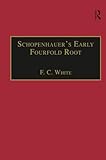Schopenhauer's Early Fourfold Root Translation and Commentary
Language: English Publication details: Oxford Routledge 20161111Edition: 1Description: 112 pISBN:- 9781138276857
Schopenhauer’s Early Fourfold Root constitutes a landmark in Schopenhaurian scholarship. It is a translation with concise commentary of Schopenhauer’s doctoral thesis as submitted to the University of Jena and published at Rudolstadt in 1813. In spite of the great and increasing interest in the writings of Schopenhauer in the English-speaking world, this work has never been translated before, and its long awaited appearance fills the only remaining gap in the philosophical works of Schopenhauer available to English-speaking readers. Schopenhauer’s thesis of 1813 is very different from the 1847 edition well known to English readers, and its appearance in translation will enable students and scholars alike to make sense of the development of Schopenhauer’s thought in a way that has been possible so far only to those at ease with Schopenhauer’s German. The translation, which keeps a fine balance between readability and philosophical accuracy, is accompanied by a commentary enabling students as well as established scholars to follow Schopenhauer’s thought with comparative ease.
There are no comments on this title.
